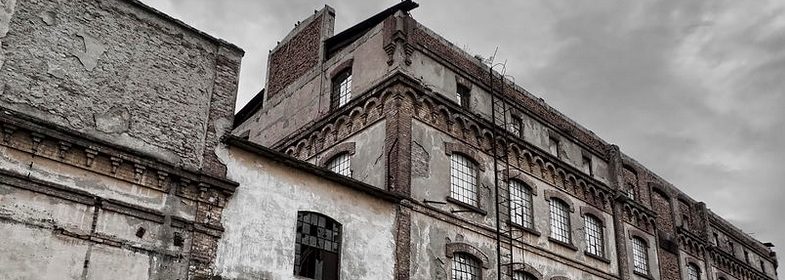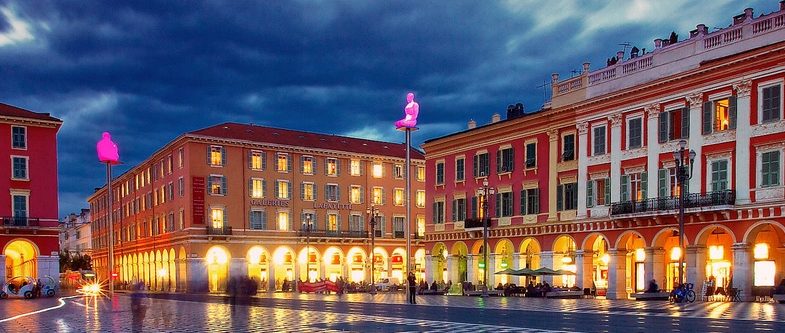I watched the taxi drive off, then looked around. I guessed I wasn’t too far from Moreau’s scooter repair shop. The west end of town was still the Old Town, but had never been kept up in the same way as the city center. A few minutes east of here, past the perimeter ring of the tram stations, the warehouses have been renovated into luxury condos, but here they were left to loom with their coal stained faces. I stopped staring up and started searching for a way down to the alley below.
Through an opening in the bridge’s eastern concrete balustrade were stairs that led down to the alley. Judging by the crushed cigarette butts and empty pint bottles, there had been some human activity on the stairs recently, giving me more confidence that I had made the right choice in trusting Alon. After a single switchback the stairs ended in the alley, a stream running down the canyon of its center, black from the night and whatever had been cast into it. I walked underneath the bridge and headed towards the light.
As I got closer to the pallid street lamp, I felt more than heard the bass emanating from the warehouse next to it. Like a metronome that sends out minor earthquakes it moved the air and rumbled the street. Taking this as another encouraging sign I kept moving, coming eventually to a single doorway, lit by the same kryptonian light as the alley. An aryan giant stood next to an entrance, his pale, bald head radiating out like a moon, the rest of him hidden by black pants and turtleneck.
He didn’t pay much attention to me until I got close. I kicked a can to make sure I didn’t sneak up on him, but he only stared at me with a combination of boredom and hostility, the kind that turns into a hatred of strangers if you leave a man on guard duty too long. I did what had always worked best on me when I was in his shoes and treated him as if he were human. After a “bonjour,” though, my question of how business was doing didn’t elicit any kind of response. Taking out my billfold I went for another tactic that I had seen work for others in this position; I flashed a little cash. While it didn’t make him more talkative it did grant me entry after paying what was probably an inflated cover charge.
The ground floor of the Factory lived up to the name, a cavernous space that reminded me of a multi-story parking garage, all cement floors, square pillars, and exposed ceilings. It was painted with industrial warning signs and stage lights. The latter moved around as much as the shifting crowd that danced out in the distance. They surrounded a stage that looked to be made out of metal pipes and speakers so large they would have made Ozzy Osborne proud.
I had rarely felt more out of my element. It helped to have a purpose. After reminding myself of what that was I headed towards the crowd, feeling older and uglier the closer I got. Standing at the rear there were a few people yelling conversations into each others ears, mostly young men wearing office clothes just ratty enough to be cool, or simple t-shirts and backward baseball caps. Most, though, particularly the women, were facing the stage, dancing to a house mix spun out by the platform’s sole occupant, a tall Swede with a tornado of hair barely held in place by the massive headphones he wore. Between the gyrating of the dancers and the club lights they formed a mass of silhouettes whose details only became visible under the occasional blast of psychedelic rays.
The likelihood of finding anyone in that sweaty mess was next to nil. Before I collided with the mass of terminally hip people that composed the riot I spotted a bar that was tucked back through several cement arches. I headed that way.
The eddies of bass the speakers were putting out carried me to the bar, which appeared to be nothing more than a series of crates stack together and painted black. The bartender, a sweaty young woman with hair the color of the Red Cross was hustling behind it, getting drinks and making change at a pace that put most of her countrymen to shame. She was primarily handing out water bottles, which told me that the crowd was probably on something other than alcohol. Not far off another hulking man wearing black pants and turtleneck stood still, his lack of movement and clothing indicating he was another member of the club’s security. I wondered how many of them were unseen in the warehouse’s dark corners.
I took all this into account as I mentally charted how I was going to navigate my way through the bar’s patrons. While planning out that tactic another part of my brain tried to figure out how I’d ask the bartender any sort of useful questions. Between my poor French and the sub-dermal pulse of the music, I wasn’t sure I’d be able to communicate the most basic questions, moreorless try to get a description across.
I was pondering the impossible auditorial physics of the situation when I spotted a familiar black and white checkered pattern on a scarf floating by. Refocusing on the person wearing it I found Balaclava walking not far from me, the taller Algerian on his other side. They had someone between them; the supporting of that downed figure turned the difference in their heights into an awkward shuffle. It also provided enough of a distraction that the Idiots didn’t notice me.
I stepped behind a nearby column, only leaning out enough to see they weren’t headed towards the exit but off somewhere deeper into the Factory. I gave them a bit of a head start then followed.
























